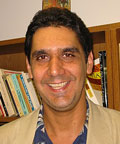
10/16/2010 – Pedro Blas González –
Traveling through the world today, I get the vivid impression that a vast number of the people I meet are living with the self-conscious belief that life is a purposeless thing to be occupied with pointless, daily tasks. I encounter this in spontaneous conversations that arise in diverse places, and with many different people. I am never surprised to hear this same complaint from others. I find it important to listen intently to what others have to say in this matter.
I suppose that to some ears this may sound presumptuous on my part. After all, we are living in a time when most people claim the right to be critics. Critics are everyone in our age. This is as comical as it is deplorable. People who have never studied or read history, literature, philosophy or much of anything else of lasting value are more interested in attacking the contemplative character of genuine ideas than they are in learning and incorporating these in their own lives. And, if these critics perceive or imagine that they are in the presence of a morally upright, righteous person, then they intensify their resistance to knowledge, to advice, to the other person before them like beasts of burden who grudgingly anticipate a difficult task. Unfortunately, today cynicism has filled in the vacuum where virtue once ruled. Heuristic learning is no longer a possibility in most circles. Wisdom is definitely not cool.
These attacks on virtue by contemporary critics are bold and sweeping, and never the least bit concerned with the astonishing degree of ignorance that they display. Such people have been savagely manipulated dating back to the 1960s: question everything ad nauseam, history, tradition, moral/spiritual values, and the integrity of the nuclear family, and the curative and cathartic value of truth. This vacuous and sporting questioning has destroyed our ability to decipher truth from falsehood, reality from dangerous illusions. Of course, like sitting ducks in a field of snipers, this fashionable nihilism, which no doubt serves political ends, has also destroyed our capacity to make sense of reality. This fashionable ignorance is dangerous to spontaneity, which is such a vital part of the health of the open society.
Of equal severity, we also find critics-in-training in all of our cherished institutions. There are those in the media, and other walks of life – all wanting to be celebrities – people who feel that they must have something to say about everything. Some of these people even think of themselves as intellectuals. This is a fatal proposition, for ideas have consequences. These are individuals who will get their fifteen minutes in the spotlight regardless of the damage they bring about. This self-consuming arrogance, in turn, sounds presumptuous to me.
Yet the reality remains that today we do not spend much time reflecting on the eternal things. Because of the proliferation of technology, and our newly fangled, fanatical liberation in embracing all things sensual, contemporary man has opted for the quick and easy. The overpowering temptation of believing that we only live for the moment captivates us. No wonder we have made it a cottage industry of making a pack with the devil. Our alleged liberation is such that even Doctor Faustus seems quaint and outdated.
The explosion of technology and the collapse of our moral imagination have essentially shackled us into living a life of purposeless hedonism. One can argue that the current explosion of all things sensual serves as a bail-out for the moral-spiritual-existential inquietude that people embraced in previous ages, and which served as a paragon of meaning and purpose. Undoubtedly, behind this push for further liberation, we encounter a sophomoric and vacuous emphasis on sex and gender. In fact, liberation is Janus-faced, for it has failed to disguise its shameless embrace of libertinism. The great fallacy of our incessant push for continual moral liberation is that while it destroys tradition for its own self-serving survival, it, in turn, creates nothing of endearing value. We might shudder if we actually understood just how much we are living off the creations of a former age. This condition may be referred to as entropy in thermodynamics, but in life, it is merely decadence unveiling yet a newer, fresher face.
The fashionable thing to do today is to compliment the lost souls that we encounter in the street, in the workplace, among acquaintances, etc., as being progressive, liberated, and most importantly, ultra-modern. These monikers bring a smile to the faces of the morality/opinion builders of today. Incidentally, while accepted as modish, none of these monikers are effective in refuting the true and time-tested truths that allow man to live dignified lives as persons.
What I really want to convey is that today we no longer have a feel for the exquisitely human essences that mark us as sentient beings. Feeling is the word I am looking for. For those who posses a keen eye in observing the human drama, very little is encountered today that resembles dedication to serious, truly contemplative questions. Instead, everywhere we turn we witness the great masses of people, who are undoubtedly led by unthinking, un-feeling elites imagining that they actually care about this and that. In the battle between appearance and reality, appearance definitely has the upper hand today.
Sure, we witness people placing pseudo concerns high on their altar of things to care about. Yet it is a curious thing to witness how these fashionable concerns are never spontaneous, but rather self-consciously contrived. It is as if these people are looking over their shoulders, always wondering how best to outdo each other in securing public relations points. This is the triumph of vile appearances. The young, in particular, have been utilized to sharpen the stake that finally annihilates the vampire that is identified with tradition. It is lamentable to watch these often emotionally unstable, meaning and purpose challenged people create problems for themselves, which are essentially no other than therapeutic, momentary ways to assuage the inherent emptiness of contemporary existence.
Politically expedient causes are all the rage. Close inspection of these trendy causes easily reveals their contradictory nature, like cutting off our right hand while getting stitches on a cut on our left. This is the essence of cool today. Yet this is of great service to the social-political power brokers who are licking their chops in this moral-spiritual bread and circus act. Moral ambiguity may be currently fashionable, but history shows that times of moral/spiritual vacuum are perfect breeding grounds for central planning and ruthless dictatorship.
And yet, what does not change, what is always present to remind us of the futility of the many tasks that we employ to pad our existence, these things are placed aside. Why would those who have struggled mightily to ensure that western culture turn its back on the timeless questions that enable us to have meaningful lives want people to reflect on the purpose of their lives? Isn’t this the whole point of virtuous autonomy? History shows that self-governing people are never in need of social engineering. Make sure that Caesar reigns supreme, and we will have triumphed in creating a social-political order that rules over every aspect of human existence. This strategy is hardly new. This is the perpetual dream of social engineers, those architects of our murderous dystopias.
Yes, we are too self-consciously modern, too preoccupied with saving the planet from mankind. Soon, we may even turn our attention to saving the solar system. This form of chic, self-consciousness actually impedes our ability and desire to undertake good and lasting deeds. It is truly lamentable that our quiet, heartfelt sacrifices are always overshadowed by the officially- sanctioned variety.
Today we are the epitome of social-political organization. But this is not enough. The destruction of the human soul is never ending. We cannot leave a stone unturned. We must meddle in everything that is metaphysical, existential in nature and morally sound. We must overturn the laws of nature. We are compelled to do so – for in accomplishing this task – we become intoxicated by the worldly, temporal power that is at our disposition. In the absence of God, we – who live by the irresponsible policies of our anointed elites – feel the urge to shake the world. We have turned our humanity into a beehive, an ant-hill of social-political experimentation of unprecedented magnitude.
What has become of concern for metaphysics of the human person? What about Essence? Let us not kid ourselves. We have castrated the power of man to respect human reality. Now we merely drift in dangerous illusions. We do not care that human reality and the constants of nature have proven to be hierarchical in nature.
But let us not forget that truth always bubbles to the top in human history. Granted, as we have witnessed in past epochs, this may not be enough to safeguard us from committing untold, heinous crimes against humanity, A.K.A., the individual. Regrettably, in some ages memory is indeed a frightening thing – or at least – it is used selectively, as an all-encompassing tool in the service of power.
HT: OrthodoxyToday



